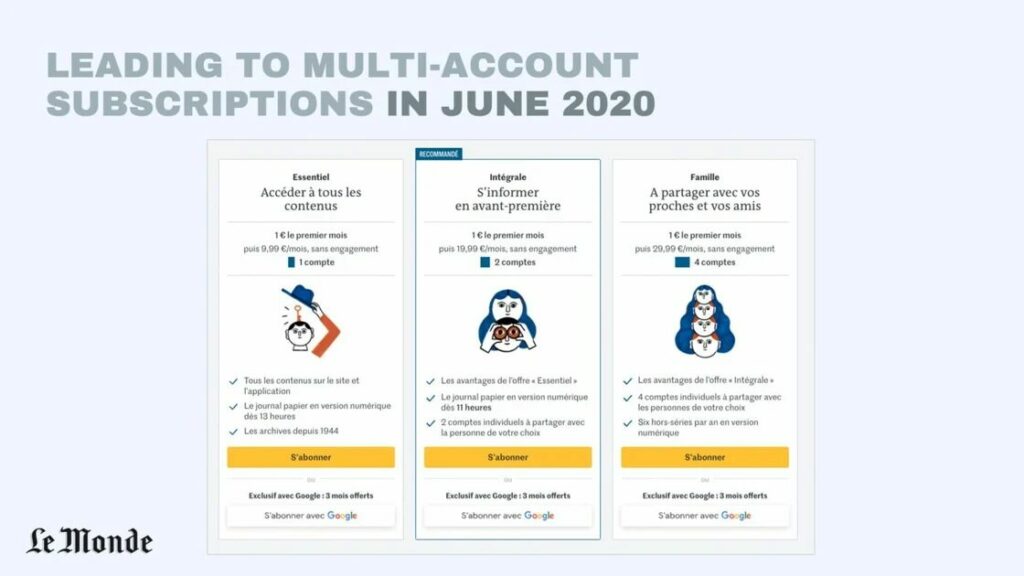

You're reading The Audiencers' newsletter #66 sent out on June 25th, 2025. To receive future newsletters straight to your inbox every two weeks, sign up here.
In today’s newsletter:
- Le Monde’s price-last approach is paying off
- Gamification meets paywalls: spinning the wheel at Blick
- Should you make cancelation easy? Duolingo teaches us to balance ambition with flexibility
- 🔗 Links links links – to add to your reading list
Le Monde’s clever “price-last” approach is paying off
Rather than starting with price, Le Monde begins by improving the offering, perceived value, user experience, and fraud prevention. Only then do they adjust the price.

What can you learn from this in practice?
> Reconsider low-entry offers – they risk decreasing perceived value
At the start of the project, Le Monde’s digital subscription offer was €1 for the first month, then €9.90/month for the first year.
This offer made it possible to acquire a significant number of subscribers, but failed to retain them in the long term as the price rose to €13 per month in the second year, then to €17.90 in the third.
> Test, test, test
The team conducted an A/B test of a price increase on 10,000 subscribers, who were divided into two groups: +$1/month and +$2/month. An informational email was sent in December for an increase to be applied in January.
“Following this test, we observed slightly better retention with the €1 per month increase compared to the €2 increase. Out of caution, and given that this was the first price adjustment under the new pricing structure, we chose to start with the €1 monthly increase, which was considered less risky—while still generating a significant increase in revenue. For certain cohorts with lower initial prices, we opted for increases greater than $1, based on the findings of this initial test.” shared Flavia Barbosa Ferreira at WAN-IFRA
> Turn password sharing into a premium benefit, with a price attached
Thanks to the development of an internal fraud detection system called “Capping” — which blocks users who are simultaneously trying to access to articles from multiple devices using the same account — this has led to an increase in “duo” and “family” subscriptions, which are sold at higher prices.
The Washington Post also recently added account sharing as a benefit.


> Full article and best practices from Le Monde on The Audiencers
Gamification meets paywalls: spinning the wheel at Blick
The team at Blick in Switzerland just launched a new experiment that they’re calling the Wheel of Luck.
The idea? Add a layer of gamification to premium content.
Specifically, the team are testing replacing the paywall with an interactive wheel for some readers, giving them the chance to win free access to the article, a few days of Blick+ access or even up to 2 months of free subscription.
And if you don’t win? No worries, you can try again in 24 hours.
It’s an innovative test, one that’s bringing a bit of fun to a typically ‘annoying’ gate for readers. I’m excited to see the results!

Should you make cancelation easy? Duolingo teaches us to balance ambition with flexibility
Duolingo has been an incredible innovator in the subscriptions space, building products and features that take habit-forming and subscription gamification-meets-learning to the next level. And there’s some important lessons to learn.
For instance, the balance of ambition and flexibility with their streaks.
If you don’t know Duolingo, users complete gamified language lessons daily to build streaks. Some become so invested in their Streaks that they share success on socials, and have been known to hide in the corner of a club at 11:58pm completing their language lesson in order to not lose their streak.
It’s an incredibly valuable retention tool.
BUT they make sure to balance ambition with flexibility:
- Streak freezes: Allowing users to take a day off without breaking their streak
- Perfect Streaks: Rewarding users who manage a week without using a freeze, acknowledging consistent effort
- Streak Repair: Users can restore a lost streak. This feature, once paid, is now free but requires users to complete additional exercises to earn the repair. This shift prioritises long-term user loyalty over quick monetisation

What does this mean for you and your cancellation journey?
Well, sometimes people need to unsubscribe, and it’s not because they don’t value your product.
“Serial subscribers are the norm, not an exception” as Riske Betten, B2C product director at Mediahuis Netherlands put it. They’re not disloyal — they’re just cycling.
To allow for this, publishers are moving towards simpler unsubscription, or more flexibility, such as The New York Times’ “Pause your subscription” option.
> Find more cancellation benchmarks and recommendations here
Recommendations to add to your reading list
- Shared in our WhatsApp Group by Ali – A list of AI initiatives by newsrooms in Europe
- In case you missed it: 45 acquisition channels to convert readers into subscribers
- Subscriptions growth fuels record revenue year for The Economist
See you in two weeks for the next newsletter,
Madeleine


